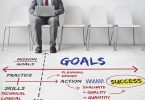In today’s rapidly evolving professional landscape, continuous learning has become the secret ingredient for sustained career development. With technology advancements, changing industry trends, and new skills in demand, professionals must embrace a lifelong learning mindset to stay competitive and thrive. In this blog post, we will explore the importance of continuous learning in career development and provide actionable tips to help you embark on a journey of ongoing skill enhancement and personal growth.
- Embrace a Growth Mindset: The foundation of continuous learning is embracing a growth mindset. Adopt the belief that your abilities and intelligence can be developed through dedication and hard work. Embrace challenges, view failures as learning opportunities, and remain open to acquiring new knowledge and skills throughout your career.
- Stay Abreast of Industry Trends: Stay updated with the latest trends, innovations, and advancements in your industry. Subscribe to industry-specific publications, follow thought leaders on social media, and participate in professional forums or webinars. Being aware of industry changes helps you identify emerging opportunities and adapt to evolving market demands.
- Seek Professional Development Opportunities: Take advantage of professional development opportunities offered by your organization, such as workshops, training programs, or conferences. These opportunities provide structured learning experiences and can enhance your skills and knowledge in specific areas. Additionally, consider pursuing certifications or advanced degrees relevant to your field.
- Develop a Personal Learning Plan: Create a personal learning plan to outline your learning goals and identify the areas you want to focus on. Set specific, measurable, achievable, relevant, and time-bound (SMART) objectives. Break down your goals into smaller milestones and create a timeline to track your progress. Regularly review and adjust your plan to ensure continuous growth.
- Harness Online Learning Platforms: Online learning platforms have revolutionized the way professionals access educational resources. Take advantage of platforms like Coursera, LinkedIn Learning, Udemy, or edX to access a wide range of courses, tutorials, and training materials. These platforms offer flexibility, allowing you to learn at your own pace and explore topics beyond your immediate area of expertise.
- Expand Your Skill Set: Identify the skills that are in demand in your industry or desired career path. Develop a plan to acquire those skills through online courses, workshops, or mentorship programs. Seek opportunities to practice and apply your newly acquired skills in real-life situations, such as through side projects or volunteering.
- Network and Collaborate: Engage with professionals in your field to expand your network and learn from their experiences. Attend industry events, join professional associations, and participate in networking activities. Collaborate with colleagues on projects or initiatives that allow you to learn from their expertise and gain new perspectives.
- Foster a Reading Habit: Develop a habit of reading books, articles, and blogs related to your industry or areas of interest. Set aside dedicated time for reading and make it a part of your daily routine. Reading not only expands your knowledge base but also exposes you to different viewpoints and insights.
- Seek Feedback and Mentorship: Actively seek feedback from your superiors, colleagues, or mentors. Constructive feedback helps you identify areas for improvement and guides your learning journey. Additionally, seek mentorship from experienced professionals who can provide guidance, share their experiences, and offer valuable career advice.
- Apply Learning in Real-Life Situations: Learning is most effective when applied in real-life scenarios. Look for opportunities within your current role or through side projects where you can apply the knowledge and skills you have acquired. Reflect on the outcomes and seek feedback to further refine your abilities.
Conclusion: Continuous learning is the key to sustained career development in today’s fast-paced world. By embracing a growth mindset, staying updated with industry trends, seeking professional development opportunities, and expanding your skill set, you can position yourself for success. Remember, career development is a lifelong journey, and investing in your learning and growth will not only benefit your professional life but also contribute to personal fulfillment and satisfaction. So, start today and embark on a path of continuous learning for a rewarding and fulfilling career.







